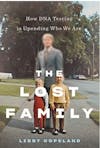Wednesday’s podcast is an interview with author Libby Copeland, an award winning journalist. In her latest book she takes us on a journey filled with twists and turns through America’s latest past time - online DNA testing. Read her book, or at least listen to the podcast and if you haven't taken the test yet, you should.
Libby takes the high science of DNA testing, folding it into the messy subject of personal, family history with all of its' joy, frustration, disappointment, surprise, love, curiosity and hope. The end result is an engaging story how everyday Americans are creating a new popular culture around what was once the dusty preserve of librarians, geneticists, scientists and historians, namely genealogy.
Once again the democratizing and accessible features of the Internet are connecting people, many of whom never knew they were related. Are there risks to sharing your personal information online ? Of course. But that train left the station 20 years ago. Take reasonable precautions with your data and work with known and reputable DNA testing services. Remember that even if you personally do not swab your cheek or spit into a vial, one of your relatives probably has and that relative has provided a DNA pathway to all of her known and unknown relatives including you.
There are three DNA tests commonly available by the largest online companies, Ancestry.com, the largest, 23andMe, FamilyTreeDNA and My Heritage. The tests are 1) autosomal - mother and father's lineage, 2) Y-DNA - male/father's line only, and 3) MtDNA. They will all give you ethnicity estimates and match you to others with whom you share DNA. There are also more specific health related tests that can show your genetic susceptibility to certain cancers, chronic disease, as well as propensity to personal characteristics like baldness and obesity.
And of course there are unintended consequences around issues of paternity, fidelity, closed adoption records, anonymity of sperm donors among others. The larger testing companies employ dedicated counsellors to field users concerns when surprising results are revealed.
The quest for self knowledge and rootedness is even stronger in an era of digital Nomadland and DNA testing can satisfy that need. The countries where such testing is most popular are the United States, the U.K., Canada, Ireland, Australia, New Zealand and Finland.
So make sure to listen to Wednesday's podcast when Libby Copeland takes us on a journey that you will find riveting.
















